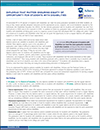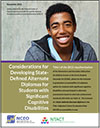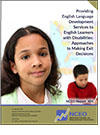Welcome!
The year 2017 already has brought with it a lot of activity. In this issue, new NCEO activities and products are highlighted. NCEO is excited to be collaborating with the University of Texas in the new National Deaf Center on Postsecondary Outcomes (see New Deaf Center Grant). Other NCEO collaborations are reflected in its work with ACHIEVE on diplomas for students with disabilities, and in its work on the state defined alternate diploma with the National Technical Assistance Center on Transition (NTACT). A new report by NCEO provides baseline information on how states are addressing the exit of English learners (ELs) with disabilities from EL services (see How States Make Exit Decisions…). Finally, in this issue we provide some updates on NCEO’s DIAMOND project activities.
– Martha Thurlow, NCEO Director
New Deaf Center Grant
NCEO is pleased to partner with the Meadows Center for Preventing Educational Risk (MCPER) to establish a national center on postsecondary outcomes for deaf individuals. A primary goal of the National Deaf Center on Postsecondary Outcomes is to increase the numbers of deaf individuals who are admitted to, without requiring remedial coursework, persist in, and complete postsecondary education or training.
NCEO Collaborates with ACHIEVE on Report on Diplomas for Students with Disabilities
 To try to understand the diploma options available for students with disabilities, Achieve and NCEO partnered to analyze the diplomas available in each state for the graduating class of 2015. The report, Diplomas that Matter: Ensuring Equity of Opportunity for Students with Disabilities, also compares the course and assessment requirements for earning a regular diploma in each state for students with disabilities and their peers without disabilities.
To try to understand the diploma options available for students with disabilities, Achieve and NCEO partnered to analyze the diplomas available in each state for the graduating class of 2015. The report, Diplomas that Matter: Ensuring Equity of Opportunity for Students with Disabilities, also compares the course and assessment requirements for earning a regular diploma in each state for students with disabilities and their peers without disabilities.
State-Defined Alternate Diplomas for Students with Significant Cognitive Disabilities
 NCEO and the National Technical Assistance Center on Transition (NTACT) recently jointly published a Brief, Considerations for Developing State-Defined Alternate Diplomas for Students with Significant Cognitive Disabilities. It describes the criteria that must be met for a State-defined alternate diploma to meet federal requirements for inclusion in the Title I Adjusted Cohort Graduation Rate (ACGR). It includes considerations for states contemplating the development of a State-defined alternate diploma, and recommends steps for those deciding to adopt a State-defined alternate diploma.
NCEO and the National Technical Assistance Center on Transition (NTACT) recently jointly published a Brief, Considerations for Developing State-Defined Alternate Diplomas for Students with Significant Cognitive Disabilities. It describes the criteria that must be met for a State-defined alternate diploma to meet federal requirements for inclusion in the Title I Adjusted Cohort Graduation Rate (ACGR). It includes considerations for states contemplating the development of a State-defined alternate diploma, and recommends steps for those deciding to adopt a State-defined alternate diploma.
How States Make Exit Decisions for English Learners with Disabilities
 NCEO recently published a new report, Providing English Development Services to English Learners with Disabilities: Approaches to Making Exit Decisions. It describes what we know about current populations of ELs with disabilities, including their numbers and disability characteristics. It then presents the results of a survey that asked states about their exit criteria. The purpose of this report is to provide a baseline report on factors that affected decisions to exit ELs with disabilities prior to the passage of the Every Student Succeeds Act (ESSA).
NCEO recently published a new report, Providing English Development Services to English Learners with Disabilities: Approaches to Making Exit Decisions. It describes what we know about current populations of ELs with disabilities, including their numbers and disability characteristics. It then presents the results of a survey that asked states about their exit criteria. The purpose of this report is to provide a baseline report on factors that affected decisions to exit ELs with disabilities prior to the passage of the Every Student Succeeds Act (ESSA).
Update on NCEO’s DIAMOND Project Activities
![]() In 2015, the National Center on Educational Outcomes and nine state partners (Minnesota, Alabama, Connecticut, Maryland, Michigan, Ohio, West Virginia, Wisconsin and the Virgin Islands) began a two-year Enhanced Assessment Grant project called “Data Informed Accessibility—Making Optimal Needs-Based Decisions (DIAMOND).” The DIAMOND project will improve the validity of state English language arts, mathematics, and English language proficiency (ELP) assessment results by developing decision-making guidelines for choosing accessibility features and accommodations for K-12 students. We present updates that include a new project website and presentations at upcoming conferences.
In 2015, the National Center on Educational Outcomes and nine state partners (Minnesota, Alabama, Connecticut, Maryland, Michigan, Ohio, West Virginia, Wisconsin and the Virgin Islands) began a two-year Enhanced Assessment Grant project called “Data Informed Accessibility—Making Optimal Needs-Based Decisions (DIAMOND).” The DIAMOND project will improve the validity of state English language arts, mathematics, and English language proficiency (ELP) assessment results by developing decision-making guidelines for choosing accessibility features and accommodations for K-12 students. We present updates that include a new project website and presentations at upcoming conferences.
NCEO’s National Assessment Center is supported through a Cooperative Agreement (#H326G160001) with the Research to Practice Division, Office of Special Education Programs, U.S. Department of Education. The Center is affiliated with the Institute on Community Integration at the College of Education and Human Development, University of Minnesota. The contents of this report were developed under the Cooperative Agreement from the U.S. Department of Education, but do not necessarily represent the policy or opinions of the U.S. Department of Education or Office within it. Readers should not assume endorsement by the federal government.
Project Officer: David Egnor
